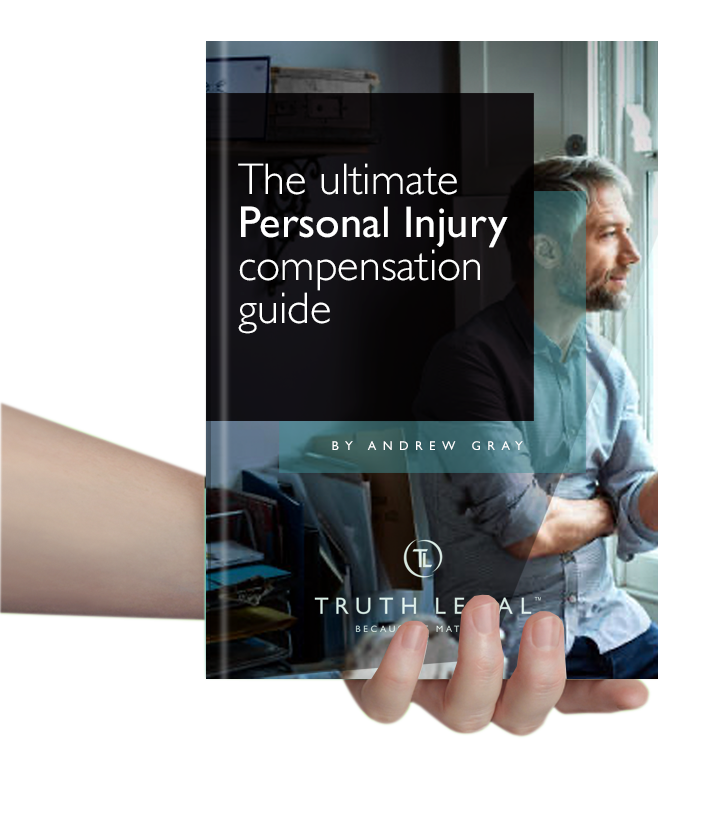The Ultimate Personal Injury Compensation Guide
This guide is your way into a greater understanding of compensation. Whether you are making a personal injury claim, thinking about doing so, or just interested in knowing more about compensation, we hope this guide will be useful to you.
Reasons to download this guide
Every chapter offers honest, ethical legal advice
Over 20 chapters of useful, actionable advice
Written by an experienced personal injury solicitor
100% Free
Welcome to The Ultimate Personal Injury Compensation Guide!
Introduction
This guide is your way towards a greater understanding of compensation. Whether you are making a personal injury claim, thinking about doing so, or just interested in knowing more about compensation, we hope this guide will be useful to you.
Personal injury can occur in many different ways though not all will give rise to a compensation claim. There must be some element of fault, in someone other than yourself, for you to have the possibility of bringing a claim. Some examples include injuries you have suffered through:
- Negligence – such as an accident at work, a road traffic collision, a slip or trip, or clinical negligence.
- Criminal assaults.
- Defective products.
- Breaches of contract.
Each one of these examples in could easily be the subject of their own guide. The way in which an injury has occurred – and proving that someone else was at fault – are topics which are beyond the scope of this guide.
Legal Definitions – Elements of a Personal Injury Claim
There are several elements to a personal injury claim: liability, causation, and quantum. This guide focuses solely on quantum but it is helpful to have an idea of what all three terms mean. Each element must be proved to make a successful claim.
Liability – The question of who is legally responsible for the incident. You could view it as who is to blame, but be aware that blame does not always mean liability. For example, a cleaner who leaves a puddle of water on the floor might be blameworthy for causing someone to slip, but their employer could also be liable for the incident.
Causation – The question of how harm or loss was caused. For an injury claim, you must prove that the injuries you suffered were a consequence of the incident in question. This is the case even if liability for the accident is accepted by the party you are claiming from.
Quantum – It sounds like something from a sci-fi film, but it really means ‘amount’ – the amount of damage or harm you have suffered. Or, to look at it another way, the amount of compensation you are claiming. You must prove the extent of your losses and injuries in order to be awarded appropriate compensation for them.
What This Guide Covers
This guide concentrates on the compensation side of things, providing easy to follow, yet detailed, information. This means looking at:
- What you can claim compensation for.
- The aims of compensation.
- How injuries and losses are valued.
- How injuries and losses are proved.
Compensation is a vital part of any personal injury claim. In other words, the question of ‘how much is it worth?’ You might hear this referred to as the ‘quantum’ of a claim (see above). In the same way that there can be disputes over fault for an accident, there can be disputes over quantum as well.
Preparing Yourself
Making a compensation claim can feel like a big step into the unknown. It can also be a big undertaking. Three things can help you to prepare for any challenges ahead:
- A strong support network. In particular, family and friends who are there to support you through a challenging episode of your life.
- The right legal representation.
- Knowledge. Taking the time to find out more about a compensation claim is very useful preparation. That’s where this guide comes in. There’s a reason why horror films don’t show the monster straightaway – the unknown is scary! By peeling away the mystery around compensation claims, we hope this guide will lay your fears to rest. It can also make you feel more involved in the claims process and less reliant on your solicitors for information.
What Should I Expect?
With everything you see and hear about compensation claims, it can be difficult to get a clear picture of what they actually involve.
American influences – especially from TV and film – might lead you to expect multi-million dollar payouts, attorneys duelling in front of a jury, and huge settlements for spilling hot coffee on yourself just because the cup didn’t tell you it would be hot!
Closer to home, newspaper headlines about personal injury claims are more likely to focus on the seemingly inevitable onset of a similar ‘compensation culture’ in the UK.
It is hard to find a true indication of the personal challenges you will face when making a claim. A good rule of thumb is to forget all you have seen on TV or film and through the media because, in reality, none of this will be your experience of a compensation claim.
You are more likely to encounter some hard truths instead. Each claim has its own unique circumstances so the impact of these may vary in your case:
- A personal injury claim will not be done in a matter of weeks.
- A personal injury claim is not a ‘get rich quick’ scheme.
- A personal injury claim will require your involvement.
- A compensation award will not make you better from your injuries on its own. It can make your life easier and help you to pay for treatment but the end of your claim does not necessarily mean the end of the harm you have suffered.
- A personal injury claim is not a way of getting revenge upon the blameworthy party – it is about helping to get your life back.
A One-Off Award For Compensation?
Personal injury claims are essentially ‘one-off’ events. When a claim is completed or settled, that’s it – it cannot be reopened or continued later. Compensation is also evaluated and paid as one lump sum in most cases. The sum should take into account the losses and injuries you have already experienced, as well as any future losses and injuries which can be attributed to the accident.
There are several exceptions to this, however, and these are looked at in a later section of the guide: ‘When Can Compensation Be Paid?’
How To Use This Guide?
This guide aims to give you as much information as possible on claiming compensation for a personal injury, but presented in a way that is clear and easy to understand.
It is organised into sections, each covering a different category of loss that you might claim for. You might feel that some of the effects of these different losses (or ‘heads of damage’ as they are called) might overlap. However, the approach taken by courts and legal professionals is to consider and deal with each loss as distinctly as possible.
You will come across a number of features throughout the guide, which are intended to keep things clear:
- Legal Source – Don’t worry, this guide isn’t going to be filled with cases and statutes like a law textbook. But it can be helpful to know where some of the more significant legal principles come from. The law of England and Wales is formed from Acts of Parliament and from influential case decisions made by judges. This case law is sometimes referred to as ‘the common law’. So the legal sources in this book will sometimes be from Acts of Parliament (or statutes) and sometimes from common law case authorities.
- Definitions – The law has a language all of its own. Technical terms are often used because they give very precise meanings, but they can also be confusing if you haven’t come across them before. Knowing a few of the more commonly-used terms can be useful, so this guide will provide definitions of them. These definitions are also collected together in the Glossary.
- Ask Your Solicitor – This icon indicates a particularly large or detailed topic which cannot be dealt with fully in this guide. If you wish to find out more about the topic, we recommend that you discuss it with your solicitor.
- Case Studies – Theory is all well and good, but sometimes a real world example can go a lot further to explaining an idea. The case studies in this guide put information into context, all using circumstances from actual cases. This can be especially handy if you have not yet begun a claim, or you have not yet encountered a topic in your claim.
- Key Points – At the end of each chapter, a list of the key points to bear in mind will be provided. If you are short on time, you could do a lot worse than to just skim read these key point lists for each topic.
Terms Used In The Guide
At the very start of this section, we explained how many ways there are for personal injury claims to arise. Rather than pack each explanation full of terms for each possible situation, the guide will use some basic terms to cover all kinds of claim. These will be:
- Accident – This is used to refer to the wrong you have suffered. It may have been a long way from being an accident (such as a criminal assault) but the term has the advantage of being often used in everyday speech for an incident which has caused a personal injury.
- Defendant – This is used to refer to the target of your claim and whoever will be compensating you in one. In some situations, these might not be the same person. For example, with most road traffic accidents the party you are claiming against (the other driver) will probably not be the same party who will end up paying your compensation (their insurance company). For ease, the guide will refer to all parties on ‘the other side’ of your claim as the Defendant.
Legal Advice
This guide is no substitute for legal advice or representation – nor does it claim to be! In any personal injury claim, it is recommended that you instruct a firm of solicitors who specialise in personal injury cases. Firms of solicitors are subject to legal regulation on how they operate.
Ask Your Solicitor – Legal Regulation: Solicitors and Non-Solicitors
Not all lawyers are created equal! In fact, the term ‘lawyer’ is not the same as ‘solicitor’.
If a legal practitioner has the title of ‘solicitor’ it means they have met certain training requirements and their work is regulated by the Solicitors Regulation Authority (the SRA). ‘Lawyer’, ‘Paralegal’, ‘Claims Executive’ etc, do not denote any such standards.
Regulation brings with it a number of protections for clients that use the services of a solicitor.
It is important to make sure you get the best standards of advice in your claim and that you are legally protected should anything go wrong with your claim.
For more information, read Truth Legal’s article on the subject.
Another crucial consideration is to choose a firm of solicitors that you trust. Making a personal injury claim where this trust does not exist is guaranteed to be a much more difficult process. You have to feel confident in the advice your solicitors are giving to you, and feel assured that they are acting in your best interests.
If your case has already been assigned to a firm, you are completely within your rights to choose another firm of solicitors to act for you instead. It is common for you to be allocated to a firm if you are claiming through your insurance company or your trade union for example. Don’t worry though, switching solicitors is remarkably simple.



